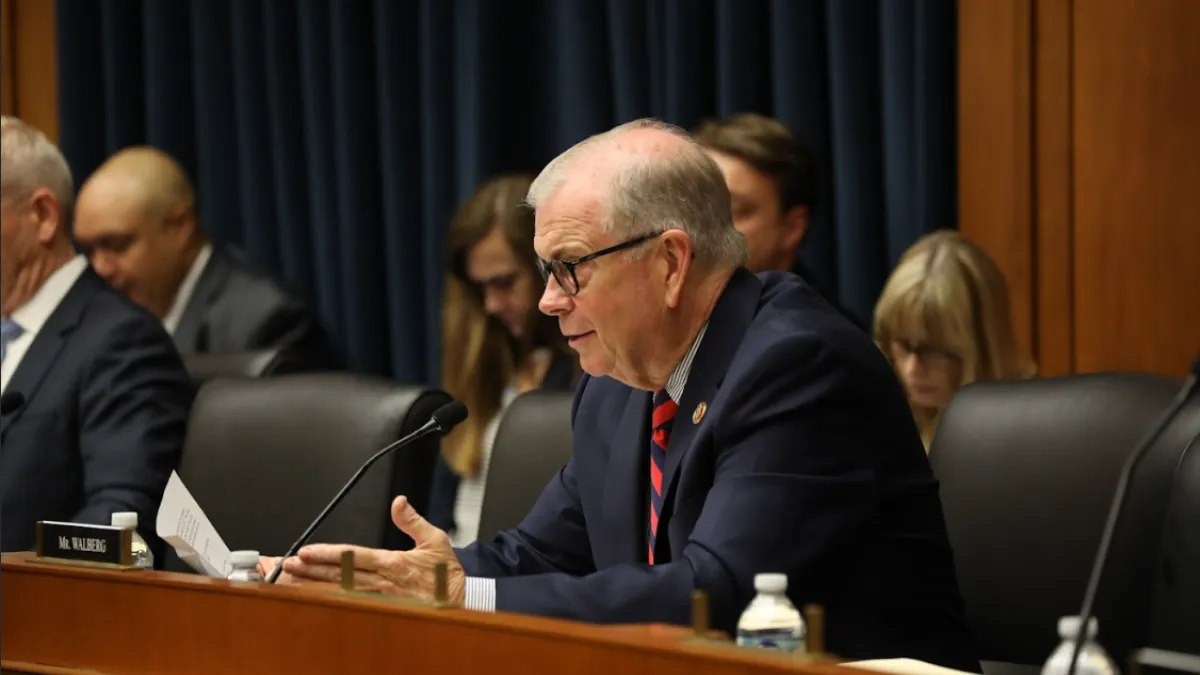Dive Brief:
- The House of Representatives Wednesday voted, 221-197, to pass the Choice in Automobile Retail Sales Act, which would bar the Environmental Protection Agency from finalizing or implementing regulations on emissions standards for cars and light-duty trucks.
- The bill is in response to the EPA’s proposed rule released in May that laid out standards to reduce emissions in light-duty vehicles beginning with model year 2027. The proposed standards would phase in over five years.
- The bill now heads to the Democratic-controlled Senate. If it passes, President Joe Biden issued a statement saying he would veto it.
Dive Insight:
The Biden administration announced the proposed emissions standards in April, stating they would “accelerate the ongoing transition to a clean vehicles future and tackle the climate crisis.”
The proposed rule calls for more stringent greenhouse gas standards for both light and medium-duty vehicles from model year 2027 through 2032. The standards would become more stringent each year, which would result in a 56% reduction in fleet average greenhouse gas emissions for light-duty vehicles and a 44% reduction for medium-duty vehicles by 2032, according to the EPA.
The standards were “designed to allow manufacturers to meet [them] however works best for their vehicle fleets,” according to an EPA press release, suggesting that automakers would utilize filters to reduce gasoline particulate emissions and implement other technologies to reduce carbon emissions in gas-powered vehicles. The agency also projected an accelerated transition to electric vehicles, as average fleet greenhouse gas emissions were estimated to fall by more than half between the model years 2026 and 2032.
Reps. Tim Walberg, R-MI, and Andrew Clyde, R-GA, introduced the CARS Act in July, just after the proposed rule’s public comment period closed.
“The Biden administration cannot continue to create regulations that limit consumer choice, hamper mobility, make vehicles more expensive for families, and cede America’s auto leadership and jobs to China,” Walberg said in a statement after the bill was introduced.
Beyond blocking the EPA from implementing the new standards, the proposed legislation would also prohibit the EPA from proposing or implementing any standards that “limit the availability of new motor vehicles based on that vehicle’s engine type.” It would also require the agency to update any regulations that already do so.
Automakers, however, have varying opinions on the proposal, according to an International Council on Clean Transportation analysis of company public comments. EV companies Lucid, Rivian and Tesla supported alternative, more stringent standards. While Volvo supported the EPA proposal as is.
Ford, Stellantis, Volkswagen and Mercedes-Benz supported less stringent standards suggested by the EPA. And 10 other automakers suggested a new standard, requiring fleets to be made up of at least 50% battery-electric, plug-in hybrid and fuel cell vehicles by 2030. Mazda was the only automaker opposed to the proposed standards.
A White House statement promising a presidential veto if the CARS Act passed stated that the bill, if enacted, would “undermine” the billions of dollars companies have invested in EV and battery manufacturing and that the EPA’s proposed standards are “key to expanding vehicle choice and savings for American drivers.











